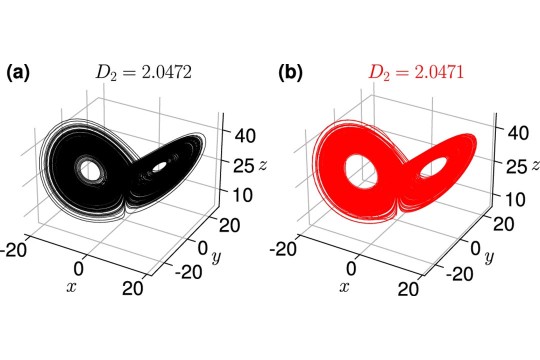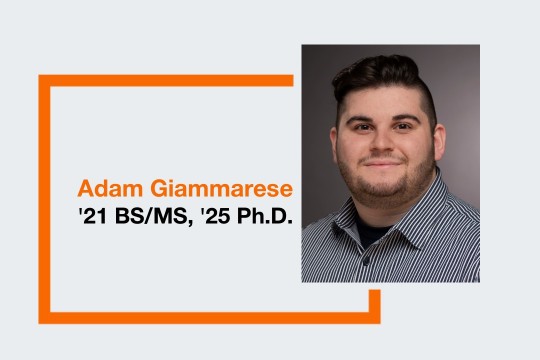Mathematical Modeling Doctor of Philosophy (Ph.D.) Degree

Mathematical Modeling
Doctor of Philosophy (Ph.D.) Degree
- RIT /
- College of Science /
- Academics /
- Mathematical Modeling Ph.D.
Model and solve complex problems across science, business, and engineering with RIT’s Ph.D. in mathematical modeling.
Overview for Mathematical Modeling Ph.D.
Mathematical modeling is the process of developing mathematical descriptions, or models, of real-world systems. These models can be linear or nonlinear, discrete or continuous, deterministic or stochastic, and static or dynamic, and they enable investigating, analyzing, and predicting the behavior of systems in a wide variety of fields. Through extensive study and research, graduates of the mathematical modeling Ph.D. will have the expertise not only to use the tools of mathematical modeling in various application settings, but also to contribute in creative and innovative ways to the solution of complex interdisciplinary problems and to communicate effectively with domain experts in various fields.
Plan of Study
The degree requires at least 60 credit hours of course work and research. The curriculum consists of three required core courses, three required concentration foundation courses, a course in scientific computing and high-performance computing (HPC), three elective courses focused on the student’s chosen research concentration, and a doctoral dissertation. Elective courses are available from within the School of Mathematics and Statistics as well as from other graduate programs at RIT, which can provide application-specific courses of interest for particular research projects. A minimum of 30 credits hours of course work is required. In addition to courses, at least 30 credit hours of research, including the Graduate Research Seminar, and an interdisciplinary internship outside of RIT are required.
Students develop a plan of study in consultation with an application domain advisory committee. This committee consists of the program director, one of the concentration leads, and an expert from an application domain related to the student’s research interest. The committee ensures that all students have a roadmap for completing their degree based on their background and research interests. The plan of study may be revised as needed. Learn more about our mathematical modeling doctoral students and view a selection of mathematical modeling seminars hosted by the department.
Qualifying Examinations
All students must pass two qualifying examinations to determine whether they have sufficient knowledge of modeling principles, mathematics, and computational methods to conduct doctoral research. Students must pass the examinations in order to continue in the Ph.D. program.
The first exam is based on the Numerical Analysis I (MATH-602) and Mathematical Modeling I, II (MATH-622, 722). The second exam is based on the student's concentration foundation courses and additional material deemed appropriate by the committee and consists of a short research project.
Dissertation Research Advisor and Committee
A dissertation research advisor is selected from the program faculty based on the student's research interests, faculty research interest, and discussions with the program director. Once a student has chosen a dissertation advisor, the student, in consultation with the advisor, forms a dissertation committee consisting of at least four members, including the dissertation advisor. The committee includes the dissertation advisor, one other member of the mathematical modeling program faculty, and an external chair appointed by the dean of graduate education. The external chair must be a tenured member of the RIT faculty who is not a current member of the mathematical modeling program faculty. The fourth committee member must not be a member of the RIT faculty and may be a professional affiliated with industry or with another institution; the program director must approve this committee member.
The main duties of the dissertation committee are administering both the candidacy exam and final dissertation defense. In addition, the dissertation committee assists students in planning and conducting their dissertation research and provides guidance during the writing of the dissertation.
Admission to Candidacy
When a student has developed an in-depth understanding of their dissertation research topic, the dissertation committee administers an examination to determine if the student will be admitted to candidacy for the doctoral degree. The purpose of the examination is to ensure that the student has the necessary background knowledge, command of the problem, and intellectual maturity to carry out the specific doctoral-level research project. The examination may include a review of the literature, preliminary research results, and proposed research directions for the completed dissertation. Requirements for the candidacy exam include both a written dissertation proposal and the presentation of an oral defense of the proposal. This examination must be completed at least one year before the student can graduate.
Dissertation Defense and Final Examination
The dissertation defense and final examination may be scheduled after the dissertation has been written and distributed to the dissertation committee and the committee has consented to administer the final examination. Copies of the dissertation must be distributed to all members of the dissertation committee at least four weeks prior to the final examination. The dissertation defense consists of an oral presentation of the dissertation research, which is open to the public. This public presentation must be scheduled and publicly advertised at least four weeks prior to the examination. After the presentation, questions will be fielded from the attending audience and the final examination, which consists of a private questioning of the candidate by the dissertation committee, will ensue. After the questioning, the dissertation committee immediately deliberates and thereafter notifies the candidate and the mathematical modeling graduate director of the result of the examination.
Residency
All students in the program must spend at least two consecutive semesters (summer excluded) as resident full-time students to be eligible to receive the doctoral degree.
Maximum Time Limitations
University policy requires that doctoral programs be completed within seven years of the date of the student passing the qualifying exam. All candidates must maintain continuous enrollment during the research phase of the program. Such enrollment is not limited by the maximum number of research credits that apply to the degree.
-
Join us for Fall 2026
Many programs accept applications on a rolling, space-available basis.
Research
The College of Science consistently receives research grant awards from organizations that include the National Science Foundation, National Institutes of Health, and NASA, which provide you with unique opportunities to conduct cutting-edge research with our faculty members.
Faculty in the School of Mathematics and Statistics conducts research on a broad variety of topics including:
- applied inverse problems and optimization
- applied statistics and data analytics
- biomedical mathematics
- discrete mathematics
- dynamical systems and fluid dynamics
- geometry, relativity, and gravitation
- mathematics of earth and environment systems
- multi-messenger and multi-wavelength astrophysics
Learn more by exploring the school’s mathematics research areas.
Featured Work and Profiles
-
Ph.D. student explores fire through visual art and math modeling
Mathematical Modeling Ph.D. student, Jenna Sjunneson McDanold, explores fire through visual art and mathematical modeling.
Read More about Ph.D. student explores fire through visual art and math modeling -
Mathematical Modeling, Curtain Coating, and Glazed Donuts
In her research, Bridget Torsey, a Math Modeling Ph.D. student, developed a mathematical model that can optimize curtain coating processes used to cover donuts with glaze so they taste great.
Read More about Mathematical Modeling, Curtain Coating, and Glazed Donuts
Related News
-
February 10, 2026

Researchers develop new method for predicting chaos
Mathematician Edward Lorenz used the butterfly effect to explain chaos theory in the 1960s. Now, decades later, a team from RIT has developed a method to predict chaos using less data, fewer parameters, and a more user-friendly format.
-
January 30, 2026

Mathematical modeling alumnus wins early career award
RIT alumnus Adam Giammarese’s work in chaos theory has earned him the Edward N. Lorenz Early Career Award, an annual recognition by the publication Chaos: An Interdisciplinary Journal of Nonlinear Science.
-
May 6, 2024

RIT graduate pursues Ph.D. across time zones
Nastaran Nagshineh, a Ph.D. candidate at RIT, successfully bridged the Rochester and Dubai campuses, paving the way for future international students. Nagshineh is one of 67 Ph.D. students who defended their thesis this academic year and who will earn their doctorate.
Curriculum for 2025-2026 for Mathematical Modeling Ph.D.
Current Students: See Curriculum Requirements
Admissions and Financial Aid
This program is available on-campus only.
| Offered | Admit Term(s) | Application Deadline | STEM Designated |
|---|---|---|---|
| Full‑time | Fall | January 15 priority deadline, rolling thereafter | Yes |
Full-time study is 9+ semester credit hours. International students requiring a visa to study at the RIT Rochester campus must study full‑time.
Application Details
To be considered for admission to the Mathematical Modeling Ph.D. program, candidates must fulfill the following requirements:
- Learn tips to apply for a doctoral program and then complete a graduate application.
- Submit copies of official transcript(s) (in English) of all previously completed undergraduate and graduate course work, including any transfer credit earned.
- Hold a baccalaureate degree (or US equivalent) from an accredited university or college. A minimum cumulative GPA of 3.0 (or equivalent) is recommended.
- Satisfy prerequisite requirements and/or complete foundation courses prior to starting program coursework.
- Submit a current resume or curriculum vitae.
- Submit a statement of purpose for research which will allow the Admissions Committee to learn the most about you as a prospective researcher.
- Submit two letters of recommendation.
- Entrance exam requirements: None
- Submit English language test scores (TOEFL, IELTS, PTE Academic, etc.), if required. Details are below.
English Language Test Scores
International applicants whose native language is not English must submit one of the following official English language test scores. Some international applicants may be considered for an English test requirement waiver.
Duolingo (DET): 140
IELTS: 7.5
LanguageCert Academic: 84
PTE Academic: 76
TOEFL: 100/5.5
International students below the minimum requirement may be considered for conditional admission. Deaf and hard-of-hearing test takers with significant hearing loss do not need to take the listening and speaking sections for the TOEFL and IELTS. Each program requires balanced sub-scores when determining an applicant’s need for additional English language courses.
How to Apply Start or Manage Your Application
Cost and Financial Aid
An RIT graduate degree is an investment with lifelong returns. Ph.D. students typically receive full tuition and an RIT Graduate Assistantship that will consist of a research assistantship (stipend) or a teaching assistantship (salary).
Additional Information
Foundation Courses
Mathematical modeling encompasses a wide variety of scientific disciplines, and candidates from diverse backgrounds are encouraged to apply. If applicants have not taken the expected foundational course work, the program director may require the student to successfully complete foundational courses prior to matriculating into the Ph.D. program. Typical foundation course work includes calculus through multivariable and vector calculus, differential equations, linear algebra, probability and statistics, one course in computer programming, and at least one course in real analysis, numerical analysis, or upper-level discrete mathematics.
Accreditation
Contact
- Mandie Klingelhoffer
- Senior Assistant Director
- Office of Graduate Admissions
- Enrollment Management
- 585‑475‑5526
- mskecr@rit.edu
- Kara Maki
- Professor, Applied Mathematics
- School of Mathematics and Statistics
- College of Science
- 585‑475‑2541
- klmsma@rit.edu
School of Mathematics and Statistics















